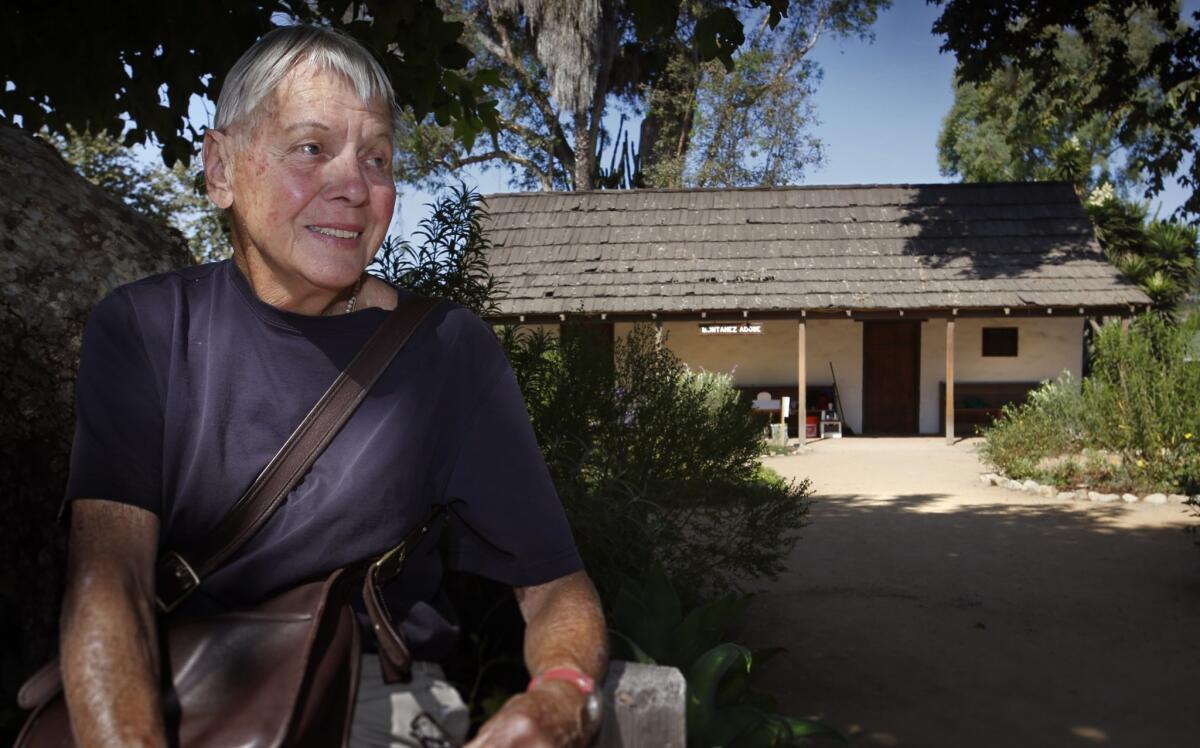Young Afghan militants ready to die, eager to kill
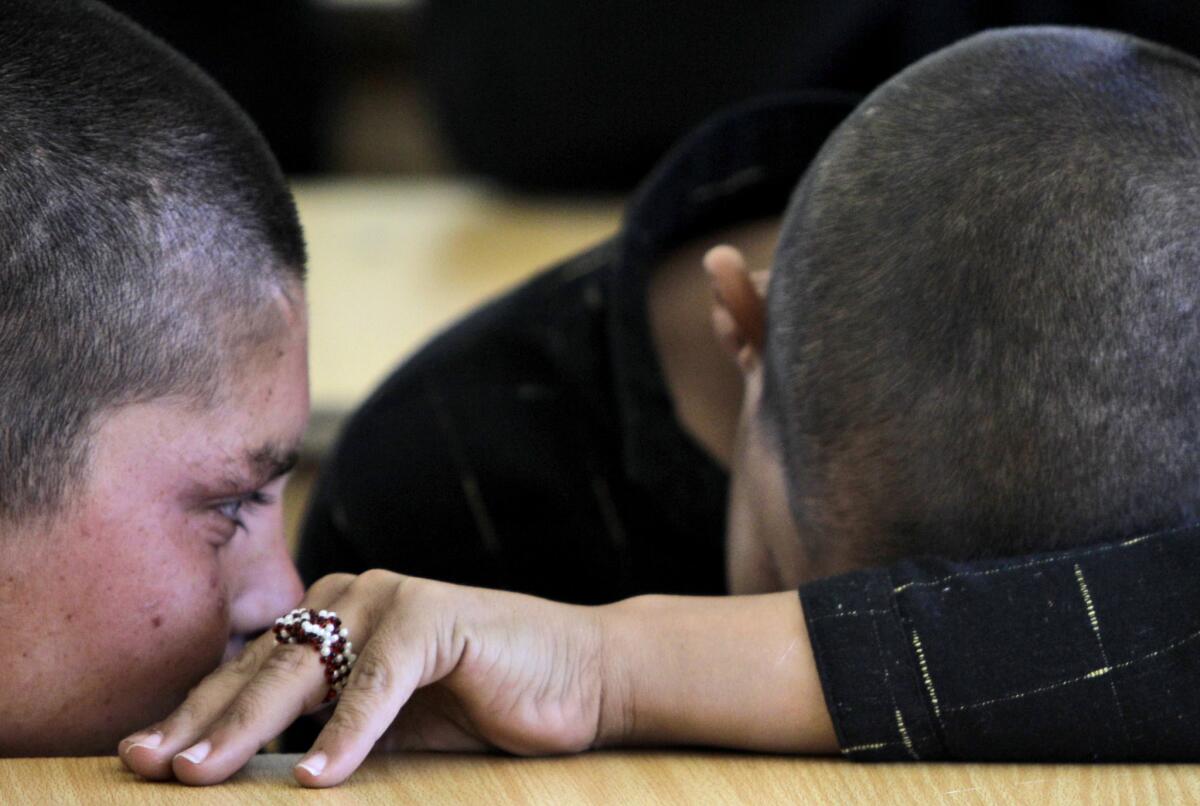
Abdul Wali Fadaei is 17 and serving a four-year term at a rehabilitation center for planning a suicide attack. When he gets out, he’ll ‘decide about trying again.’
- Share via

Abdul Wali Fadaei is proud of his family history.
His father died when he drove an explosives-laden car into the capital's upscale Hotel Inter-Continental in 2011, a brazen attack that killed 18 people, including seven militants.
His brothers — he won't say how many or their ages — are studying to become suicide bombers.
Fadaei, 17, was arrested last year before he was able to detonate the explosives he'd transported in a Toyota from Kandahar to Kabul in order to kill Americans.
"The message my father left me when he became a martyr was that I should follow him," Fadaei said, speaking in a matter-of-fact tone while sitting on a thin mattress in a small, dank room in Kabul's government-run juvenile rehabilitation center.
"I regret my attack failed, but I gained by trying. I'll decide about trying again after I'm out."
Next to him sat Esmatullah Bilal, with a crew cut and an Abe Lincoln beard. He got caught with a 26-pound suicide vest shortly before a planned attack.
Bilal, who's 17 too, doesn't feel any remorse. Quite the opposite, in fact.
"I want to kill foreigners in Afghanistan," he told a Western reporter, intensity emanating from his dark eyes. "If you live here, we'll come after you and kill you. You're lucky you're so close and you're not dead."

The youths are two of 35 militants in custody at the juvenile center on Kabul's pothole-strewn Badam Bagh Road. Most of the nearly 250 other detainees, ages 12 to 18, are being held for robbery, vehicular manslaughter, delinquency or other crimes.
You're lucky you're so close and you're not dead."— Esmatullah Bilal, aspiring suicide bomber
All inmates take two hours of basic math and literacy classes each morning. Militants then study the Koran for 90 minutes on their own until lunch. (Most of the other youths pass on that option.) In the afternoon, there are vocational classes, such as tailoring, and the option to lift weights or play pingpong.
Officials of the center, an unmarked two-story building surrounded by a double-layer metal fence, razor wire, a 15-foot wall and guard towers, used to separate militants from the general population.
After hard-line juveniles were caught planning attacks, however, the groups were combined in an attempt to dilute the militants' power, an approach viewed skeptically by Western experts wary that militants will recruit others.
In fact, Fadaei and other failed suicide bombers say they work to "educate" fellow detainees about jihad. While most don't listen, they said, a few do.
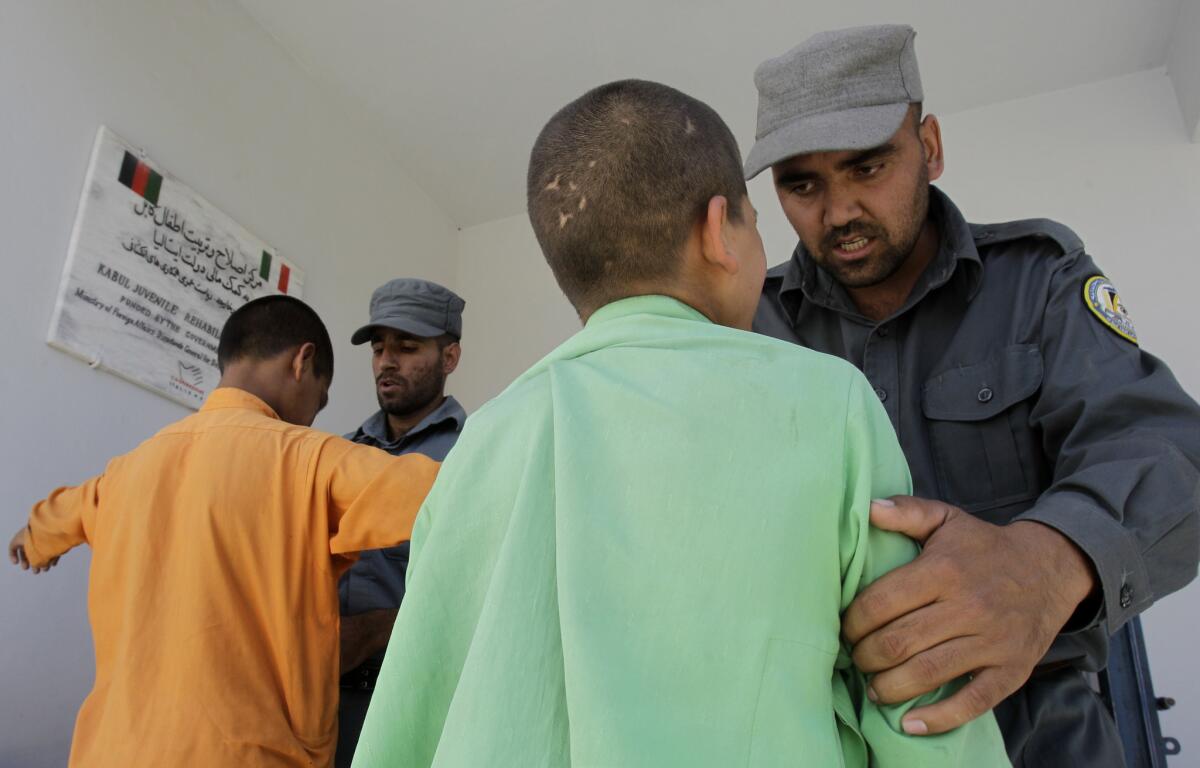
Guards search boys outside their cells. (Kamran Jebreili / Associated Press) More photos
Afghanistan's detention system does little to stem the spread of extremism among young people or adults, analysts say, and may actually harden those inside by allowing them to cultivate networks of like-minded individuals. Facilities are overcrowded, understaffed and highly dependent on the honesty and commitment of their directors or wardens.
Although the Kabul facility is called a rehabilitation center, the center's acting director, Abdul Qadim Manzur, has his doubts.
"It's sad, but there isn't much we can do," he said with a sigh in an office of near-empty bookcases and overstuffed chairs. "These children are very deeply affected."
It's one of the few things on which Manzur and Fadaei agree.
"When you have strong faith, their activities won't change you," said Fadaei, cracking his knuckles as he spoke.

Children and teenagers enlisted into extremism are influenced by family members, human smugglers or recruiters at hard-line seminaries just across the border in Pakistan, rehab center administrators said. The youngsters are taught to hate "infidels" and are promised virgins in paradise.
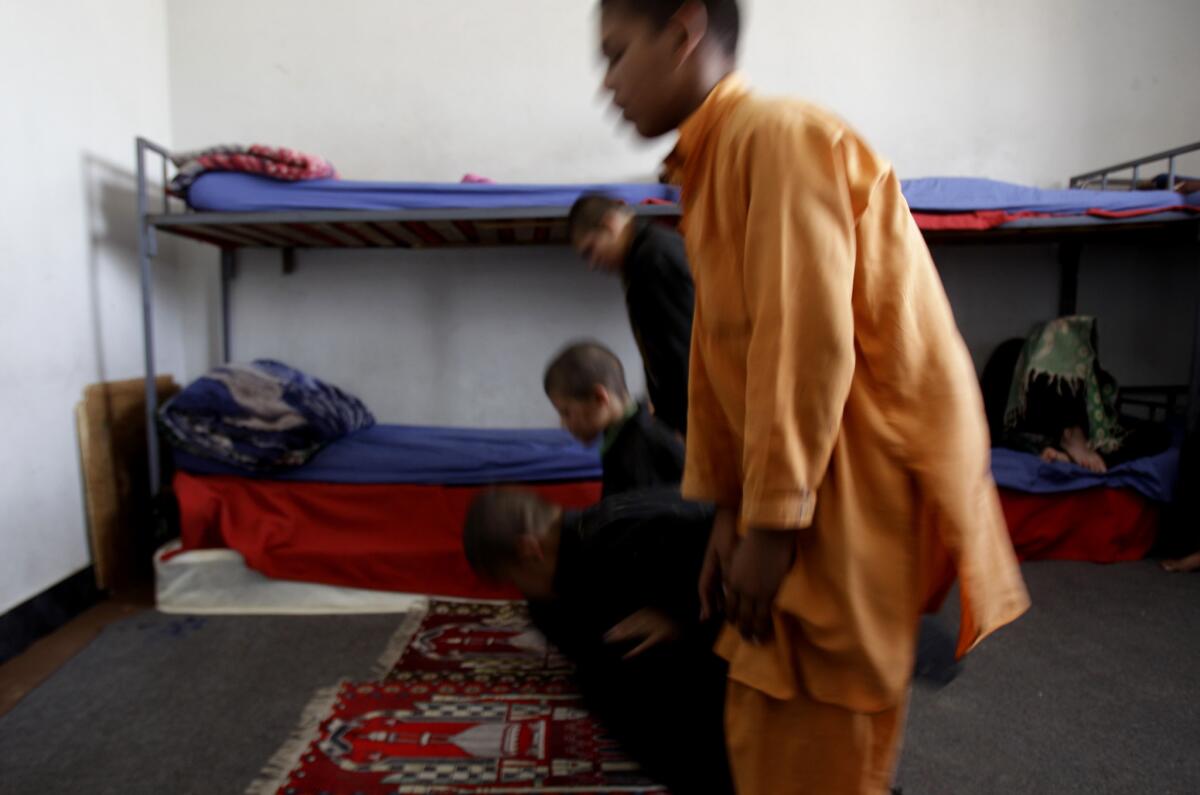
Boys pray at the rehabilitation center. (Kamran Jebreili / Associated Press) More photos
"Islam is a very powerful religion that's used to fan hatred," Manzur said. "If we were in their training center 24/7, we'd become brainwashed too."
The U.N. mission in Afghanistan has documented 23 cases of boys recruited by the Taliban and other extremist groups in the first half of 2013 compared with 66 for all of 2012. Experts say the actual figure is probably far higher. Most of the youngsters were employed as suicide bombers or to plant roadside bombs. There were 189 militant youths in Afghan juvenile rehabilitation centers in 2012, the government said.
Children offer several advantages for militant groups, said Daveed Gartenstein-Ross, a Washington-based attorney and radicalism expert. Youngsters, he said, are impressionable, don't have dependents and tend to wholeheartedly embrace causes.
Along the fence outside the juvenile detention center, dozens of boys whooped and screeched as a visitor passed. A few simulated the donning of a suicide vest and pressing of a detonation trigger. Then they gave thumbs-up signs.

Fadaei said he had wanted to carry out his attack in Kabul because bloodshed in the capital receives more attention.
He said it took two days to drive to the city, working his way around checkpoints. Once he arrived, he got lost and had to ask for directions. He was arrested a few hours later in a safe house, shortly before he was to carry out the suicide attack.
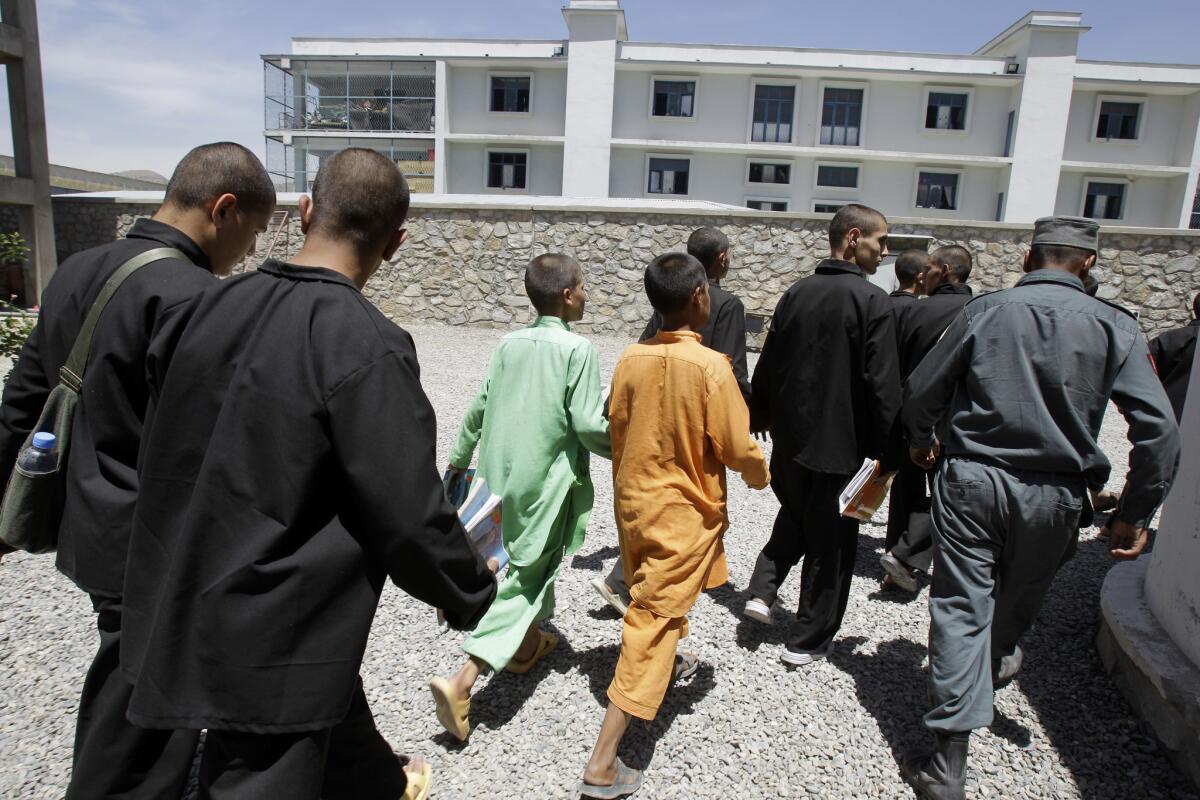
Inmates at the juvenile rehabilitation center in Kabul, Afghanistan, return to their cells. (Kamran Jebreili / Associated Press) More photos
He doesn't know what or who gave him away, but he's been in detention for a year now, with three left to go on his sentence.
A quiet, almost likable confidence emanates from Fadaei, whose round face is patched with an adolescent beard. He said he'd never attended school, but did train in a camp for his mission. His trainers weren't the same people who taught his father, but training centers are everywhere, he claimed, some preparing more than 200 children for suicide missions.
Seated beside Fadaei on the mattress, Mahmadin, who uses one name, wouldn't say much, apparently reluctant to jinx his release date, less than a month away. He wore a childish bead ring he'd made himself, with an M in it for his name. He whispered his answers to his peers, saying he was "16 or 17." He had been caught in Kabul wearing a suicide vest.
Bilal was dismissive of a guard in an ill-fitting uniform who sat nearby, pointedly saying he didn't care what the guard heard because it was the truth.
Training camp recruits are as young as 8, he said. They practice with vests that get heavier as they age, with the biggest boys donning 35-pounders. He said he wasn't big enough yet to handle the largest sizes.
Repeatedly, he asked the reporter why he wasn't a Muslim, saying all other religions were discredited after Islam was founded. He also warned that nonbelievers face hellfire after they die.
"This world is paradise for infidels but prison for true Muslims," Fadaei said. "Our real world is the next world."

There's little mental health expertise in Afghanistan, despite deep psychological scars born of decades of war, brutality and poverty.
A few years ago, the juvenile center employed a psychologist who made progress deprogramming militant juveniles, Manzur said. But the specialist returned to Iran and wasn't replaced.
Most adult and juvenile deprogramming and rehabilitation programs, whether in Yemen, Saudi Arabia, Indonesia, Singapore or elsewhere, are two-pronged, said Marisa L. Porges, a research fellow at Harvard's Kennedy School. One element is literacy training, vocational skills and job placement. The other targets ideology, often using moderate Muslim clerics who offer a more mainstream version of Islam.
He was so indoctrinated at such a young age."— Marnie Gustavson of Parsa, a group focused on women and child welfare, speaking of a young would-be suicide bomber
The success of the programs is mixed: Many deem Yemen's program largely ineffective; analysts rank Singapore's among the most effective, in part because of its intrusive approach. And the Saudi program is the best-financed.
But Afghanistan's reform programs aren't well-funded, structured or particularly effective, analysts say. Nor is there adequate security for those trying to help.
"There's no real effective programs for militant youngsters in Afghanistan," said Marnie Gustavson, executive director of Kabul-based Parsa, a civic group focused on women and child welfare.
The group tried for three months to rehabilitate an 11-year-old would-be suicide bomber from Pakistan before he stole a phone and called his handlers. They threatened Parsa officials if they didn't let him go. One day he just disappeared, presumably picked up by his contacts and taken back to the border area.
"He was so indoctrinated at such a young age; at some point it was like a switch going on," she said. "He was going to repeat. He was a bomb."
Follow Mark Magnier (@markmagnier) on Twitter
Follow @latgreatreads on Twitter
More great reads
She's now 93, and the story of this Rosie is still riveting
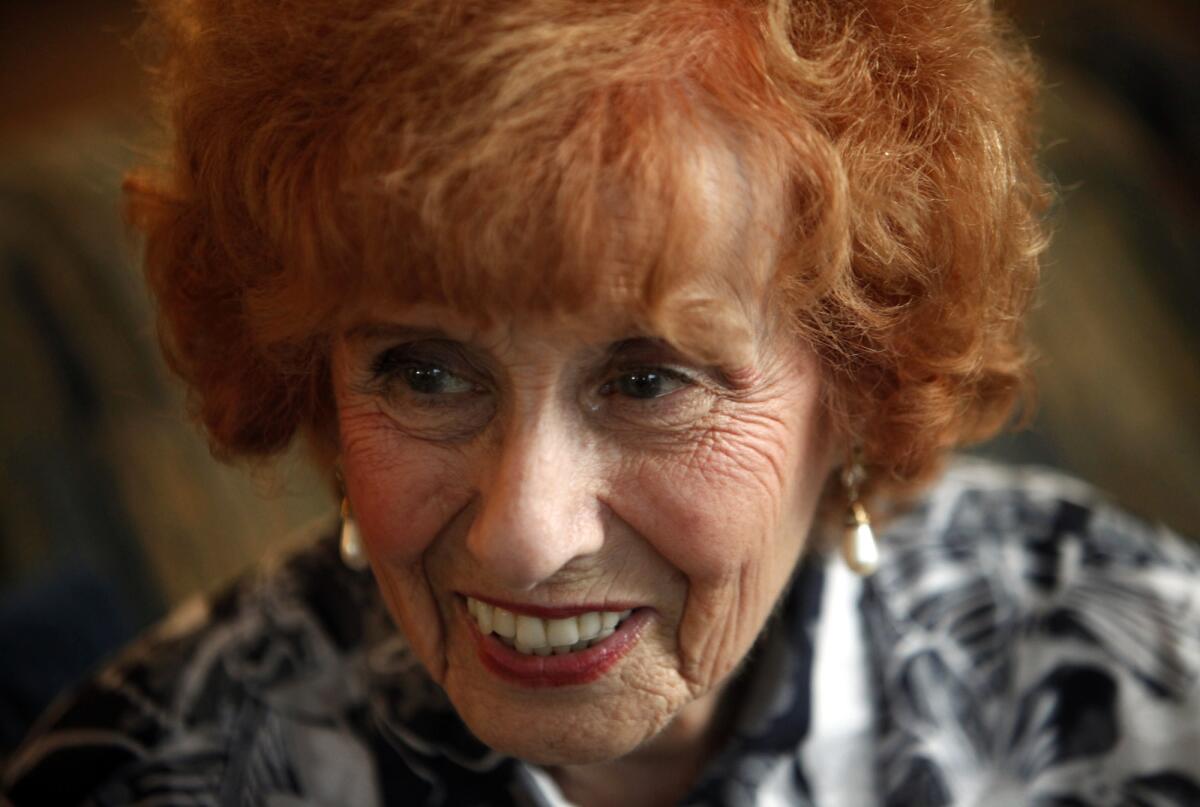
It's a powerful story, a positive story, and one hell of a tribute to the female work force."
Sign up for Essential California
The most important California stories and recommendations in your inbox every morning.
You may occasionally receive promotional content from the Los Angeles Times.
